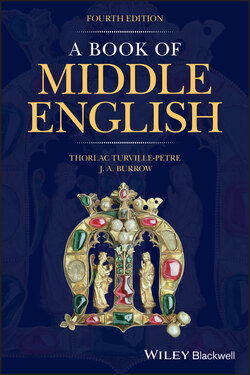Читать книгу A Book of Middle English - J. A. Burrow - Страница 55
5.2 Number
ОглавлениеThere is variation in the treatment of collective nouns, such as ‘court’, ‘folk’, ‘world’, just as there is today: al þe tunscipe (sg.) flugæn (pl.), 1/49; al watz (sg.) þis fayre folk in her (pl.) first age, 9/54. In 8/157, bale, ‘packages’, is treated as a singular noun with plural sense.
A co‐ordinated group of nouns may be regarded as a single entity: þe sege and þe assaut watz sesed, 9/1.
After numerals nouns sometimes have no plural ending. Some (e.g. ʒer, ‘years’) may be explained as survivals of Old English nouns with unchanged plurals, and others (e.g. siþe, ‘times’) represent former genitive plurals after numerals (see 5.3.2 below). Examples are: xix wintre, 1/55, foure and twenty ʒere, 6/104, fyfty syþe, 14j/46. ‘Many’ is often accompanied by the singular: wes moni ʒimston, 3/17, mony luflych lorde, 9/38.
As in Old English, the neuter pronoun ‘it’ may be used with the verb are/were to refer to a plural subject: hit are my blody bretherne, 7b/217, hit arne refetyd, ‘they are fed’, 11/304.
